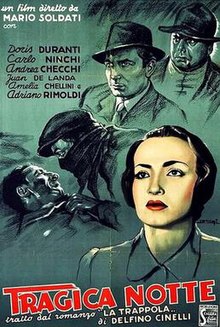Tragic Night
| Tragic Night | |
|---|---|
 | |
| Directed by | Mario Soldati |
| Written by | |
| Based on | La trappola by Delfino Cinelli |
| Starring | |
| Cinematography | |
| Edited by | Marcella Benvenuti |
| Music by | Giuseppe Rosati |
Production company | |
| Distributed by | Scalera Film |
Release date | 20 March 1942 |
Running time | 80 minutes |
| Country | Italy |
| Language | Italian |
Tragic Night (Italian: Tragica notte) is a 1942 Italian
Synopsis
One day in the countryside the
Two years later, much time has passed and Stefano pretends to be friendly towards Nanni. He notices that he is particularly sensitive about his wife, Armida, a woman from Florence who he had married just before he had been sent to prison. His chance comes when the count returns to his estate after two years in America. Stefano hints to Nanni about a secret relationship between the Count and his wife, based on a brief attempt by the count to flirt with Armida two years earlier, before he realised she was married.
Despite the fact that they had been childhood friends, Stefano manages to persuade Nanni that the Count is betraying him. Stoking his jealousy, he lures him out one night to a hunt for badgers, promising that the count has invited him. Instead Sefano tries to ambush him in revenge for his humiliation two years before, but Nanni is too quick and shoots him dead. The Count, at last realising what is happening, arrives on the scene. Nanni aims his gun at him, but the Count reminds him of their childhood bond. It is clear to Nanni that he had no ulterior motives towards his wife and he lowers his gun. When the other villagers arrives, the Count takes the blame for the shooting, claiming it was an accident on his part.
Main cast
- Doris Duranti as Armida
- Carlo Ninchi as Stefano
- Andrea Checchi as Nanni
- Juan de Landa as Faille
- Amelia Chellini as Zelinda, la madre di Armida
- Adriano Rimoldi as Il conte Paolo Martorelli
- Giulio Battiferri as Gino
References
- ^ Brunetta p.99
Bibliography
- Brunetta, Gian Piero. The History of Italian Cinema: A Guide to Italian Film from Its Origins to the Twenty-first Century. Princeton University Press, 2009.
External links
- Tragic Night at IMDb
